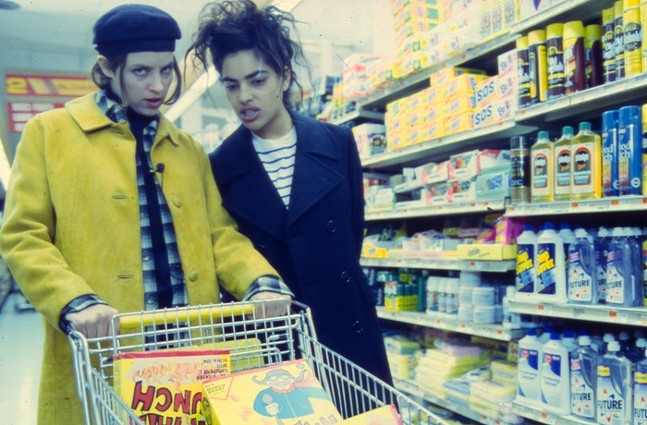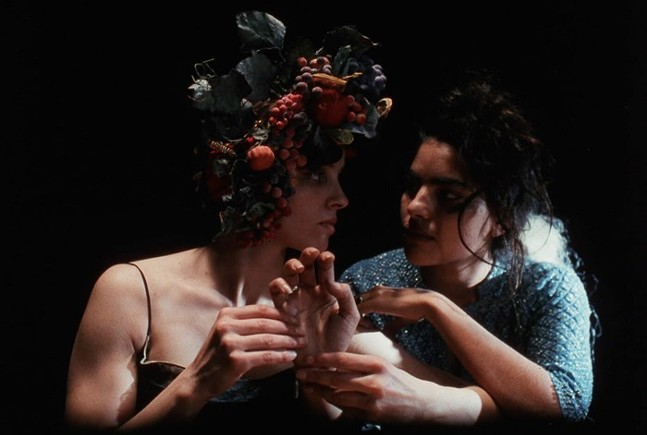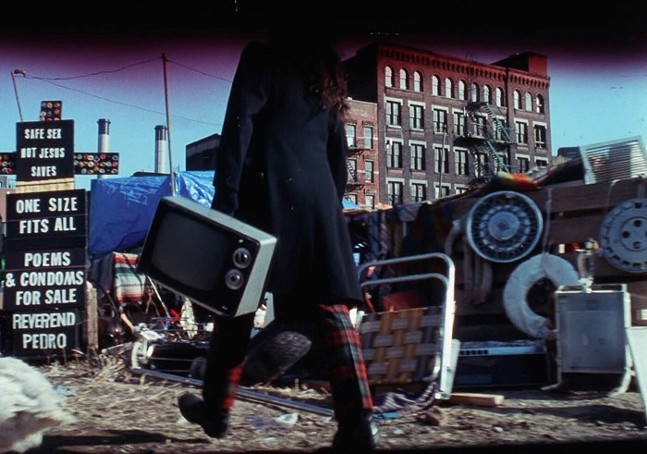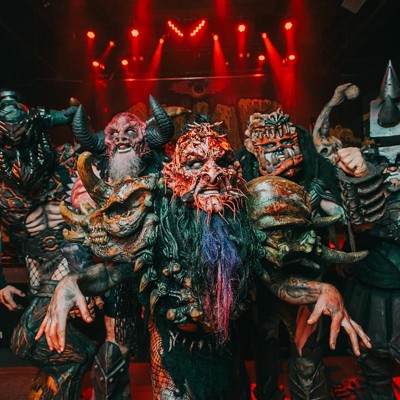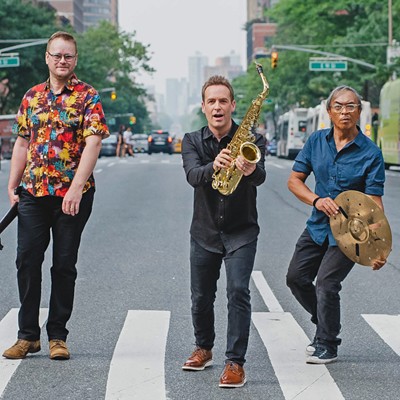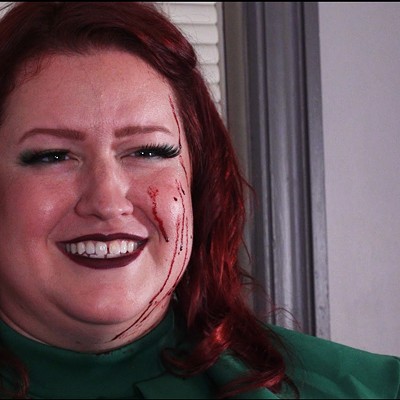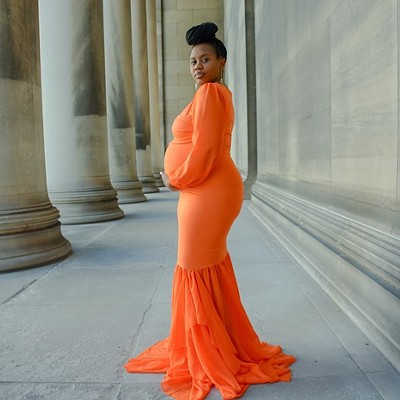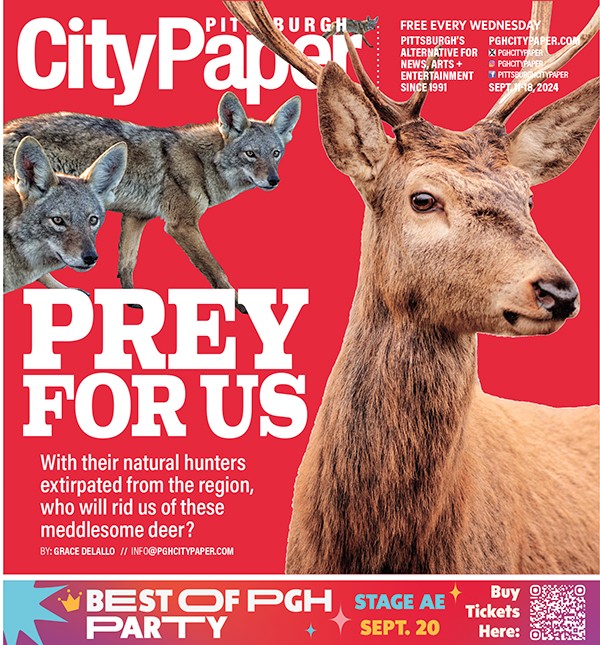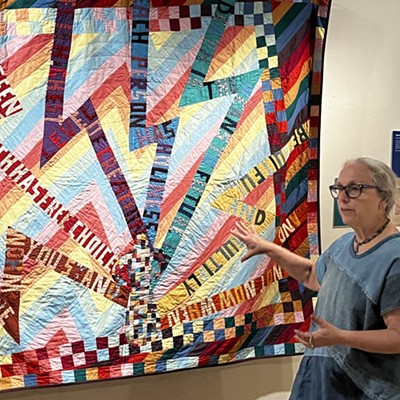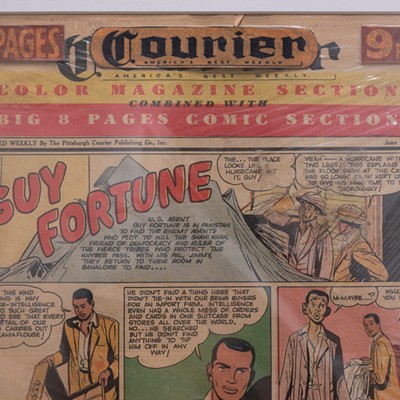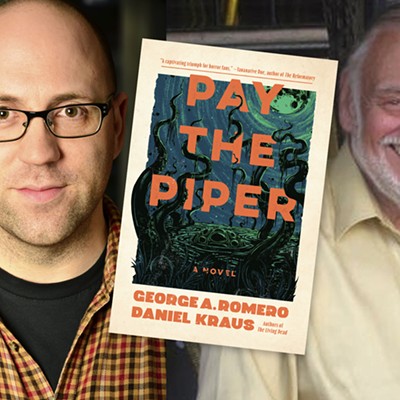Rare cult film Fresh Kill still feels relevant and revolutionary after 30 years
[
{
"name": "Local Action Unit",
"component": "24929589",
"insertPoint": "3",
"requiredCountToDisplay": "1"
}
]
“Where do you think the wonder’s gone?” Such is the question posed by a New Yorker slowly being poisoned by radioactive food that also turns cats green.
Welcome to the world of Fresh Kill, Taiwanese-American filmmaker Shu Lea Cheang's visionary 1994 cyber-thriller. Extremely influential among film fans and in the counterculture, the film has nevertheless gone relatively underseen since its release. Pittsburghers will have the privilege of seeing a rare 35mm print of the film, and the chance to engage with Cheang during a Q&A.
Pittsburgh Sound + Image and Screenshot Asia will present a screening of Fresh Kill on Sun., Sept. 15 at the Harris Theater as part of a larger celebration of the film’s 30th anniversary, with Cheang taking a restored print around the country in five reels and two cans. Before the Harris, Cheang screened Fresh Kill at the Brooklyn Academy of Music, Brattle Theatre in Boston, Wexner Art Center in Columbus, Music Box Theater in Chicago, and Roxie Theater in San Francisco.
It’s a decidedly “retro” way of showing the film, as physical prints of movies are increasingly being abandoned in favor of cheaper, digital showings. The approach is fitting, however, for a filmmaker who never showed any interest in doing things the easy way.
“Fresh Kill was shot in 35mm in New York City in the early 90s. At the time, most independent filmmaking was done in 16mm/super 16mm," Cheang tells Pittsburgh City Paper in an email interview. "So myself, my producers, my film crew, we proclaimed shooting in 35mm was a political act.”
That tracks for a nakedly political film (the Harris website describes it as an "avant-anarcho ecosatire"), one that was radical at the time and has only gotten more prescient. It centers on Shareen (played by prolific British actor Sarita Choudhury, who recently joined the HBO Sex and the City revival series And Just Like That...) and Claire, a lesbian couple raising their daughter Honey in the shadow of the real-life Fresh Kills landfill on Staten Island. When Honey disappears, Claire and Shareen team up with hackers, poets, and sushi chefs to expose corporate corruption and recover their daughter.
The film feels like a rebellious fever dream, set in a vibrant, bygone New York City that's bursting at the seams with humanity, creativity, and multicultural lust for life, all being suffocated under the weight of growing capitalism, grinning suits pumping and dumping monopolies for share points while gleefully spinning their way through buzzwords on TV. Fresh Kill was shouting from the rooftops about environmental collapse and corporate malfeasance, and how it all disproportionately affects marginalized groups.
Its revolution comes in all forms, radiating outwards from its form as much as from its function. Every frame in Fresh Kill is gorgeously composed but not in a traditional sense. A pink hue often lingers at the top of the screen, representing the toxic haze hanging over the protagonists. Plot details are told through staticky television sets, entire scenes are lit or staged in ways that feel intentionally unnatural, and everything is edited together in a wholly experimental manner. It all underscores its political urgency, chipping away at the power structures of conventional filmmaking, one bold decision at a time.
“The larger context of social/political/economical constructs being the domination of large corporations, we choose to remain fighting from within,” Cheang writes. “Every little fight we make on a personal level adds up. Matter is to know we have the community power. With this road trip, I need this re-confirmation of communities, from the grassroots level and up.”
The film's themes feel as relevant now as they were in 1994, especially in a city like Pittsburgh. The intertwined nature of the region’s economy with the long-term effects of the steel industry has become more stark over the years, and the pink haze hanging over Fresh Kill may evoke Pittsburgh's ever-questionable air quality.
For Cheang, however, this film isn’t about one specific city or even one specific issue. It’s about inspiring a new generation of audiences to find its urgency, and the need to act on it in whatever small way they can. “I want to revive passion, desire and action, to activate as the conditions for living remain to be upgraded,” she writes. “The film, 30 years later, is speaking to a younger audience as witnessed at its BAM (Brooklyn Academy of Music) premiere of its brand new 35mm print last April. We got a cheering, excited crowd. I want to find this crowd along the road trip.”
And that’s the thing: Fresh Kill is a blast. Yes, it’s experimental and often strange. But it’s consistently funny, energetic, and never shy about its love for the people it portrays and the act of filmmaking itself. Cheang is full force in everything she does, unapologetically executing a vision of everything wonderful and everything sad about our world.
She left me with a thought: “The title Fresh Kill is inspired by the name of the world’s largest waste dump landfill on Staten Island, NYC. And today, it has been transformed into a park. So where does all the garbage, the waste go?? Why did onions used to grow in Spring, and now grow in the Fall?”
Fresh Kill with Shu Lea Cheang. 7:30 p.m. Sun., Sept. 15. Harris Theater. 809 Liberty Ave., Downtown. $15. Includes Q&A with Cheang. trustarts.org
Welcome to the world of Fresh Kill, Taiwanese-American filmmaker Shu Lea Cheang's visionary 1994 cyber-thriller. Extremely influential among film fans and in the counterculture, the film has nevertheless gone relatively underseen since its release. Pittsburghers will have the privilege of seeing a rare 35mm print of the film, and the chance to engage with Cheang during a Q&A.
Pittsburgh Sound + Image and Screenshot Asia will present a screening of Fresh Kill on Sun., Sept. 15 at the Harris Theater as part of a larger celebration of the film’s 30th anniversary, with Cheang taking a restored print around the country in five reels and two cans. Before the Harris, Cheang screened Fresh Kill at the Brooklyn Academy of Music, Brattle Theatre in Boston, Wexner Art Center in Columbus, Music Box Theater in Chicago, and Roxie Theater in San Francisco.
It’s a decidedly “retro” way of showing the film, as physical prints of movies are increasingly being abandoned in favor of cheaper, digital showings. The approach is fitting, however, for a filmmaker who never showed any interest in doing things the easy way.
“Fresh Kill was shot in 35mm in New York City in the early 90s. At the time, most independent filmmaking was done in 16mm/super 16mm," Cheang tells Pittsburgh City Paper in an email interview. "So myself, my producers, my film crew, we proclaimed shooting in 35mm was a political act.”
That tracks for a nakedly political film (the Harris website describes it as an "avant-anarcho ecosatire"), one that was radical at the time and has only gotten more prescient. It centers on Shareen (played by prolific British actor Sarita Choudhury, who recently joined the HBO Sex and the City revival series And Just Like That...) and Claire, a lesbian couple raising their daughter Honey in the shadow of the real-life Fresh Kills landfill on Staten Island. When Honey disappears, Claire and Shareen team up with hackers, poets, and sushi chefs to expose corporate corruption and recover their daughter.
The film feels like a rebellious fever dream, set in a vibrant, bygone New York City that's bursting at the seams with humanity, creativity, and multicultural lust for life, all being suffocated under the weight of growing capitalism, grinning suits pumping and dumping monopolies for share points while gleefully spinning their way through buzzwords on TV. Fresh Kill was shouting from the rooftops about environmental collapse and corporate malfeasance, and how it all disproportionately affects marginalized groups.
Its revolution comes in all forms, radiating outwards from its form as much as from its function. Every frame in Fresh Kill is gorgeously composed but not in a traditional sense. A pink hue often lingers at the top of the screen, representing the toxic haze hanging over the protagonists. Plot details are told through staticky television sets, entire scenes are lit or staged in ways that feel intentionally unnatural, and everything is edited together in a wholly experimental manner. It all underscores its political urgency, chipping away at the power structures of conventional filmmaking, one bold decision at a time.
“The larger context of social/political/economical constructs being the domination of large corporations, we choose to remain fighting from within,” Cheang writes. “Every little fight we make on a personal level adds up. Matter is to know we have the community power. With this road trip, I need this re-confirmation of communities, from the grassroots level and up.”
The film's themes feel as relevant now as they were in 1994, especially in a city like Pittsburgh. The intertwined nature of the region’s economy with the long-term effects of the steel industry has become more stark over the years, and the pink haze hanging over Fresh Kill may evoke Pittsburgh's ever-questionable air quality.
For Cheang, however, this film isn’t about one specific city or even one specific issue. It’s about inspiring a new generation of audiences to find its urgency, and the need to act on it in whatever small way they can. “I want to revive passion, desire and action, to activate as the conditions for living remain to be upgraded,” she writes. “The film, 30 years later, is speaking to a younger audience as witnessed at its BAM (Brooklyn Academy of Music) premiere of its brand new 35mm print last April. We got a cheering, excited crowd. I want to find this crowd along the road trip.”
And that’s the thing: Fresh Kill is a blast. Yes, it’s experimental and often strange. But it’s consistently funny, energetic, and never shy about its love for the people it portrays and the act of filmmaking itself. Cheang is full force in everything she does, unapologetically executing a vision of everything wonderful and everything sad about our world.
She left me with a thought: “The title Fresh Kill is inspired by the name of the world’s largest waste dump landfill on Staten Island, NYC. And today, it has been transformed into a park. So where does all the garbage, the waste go?? Why did onions used to grow in Spring, and now grow in the Fall?”
Fresh Kill with Shu Lea Cheang. 7:30 p.m. Sun., Sept. 15. Harris Theater. 809 Liberty Ave., Downtown. $15. Includes Q&A with Cheang. trustarts.org

